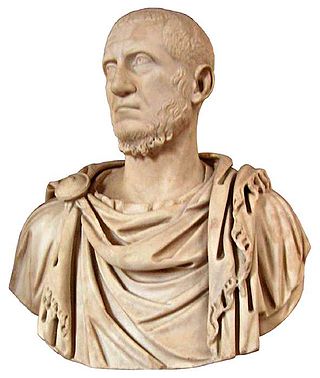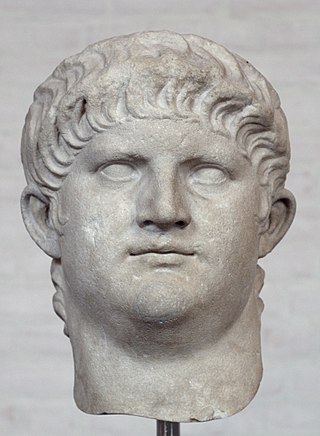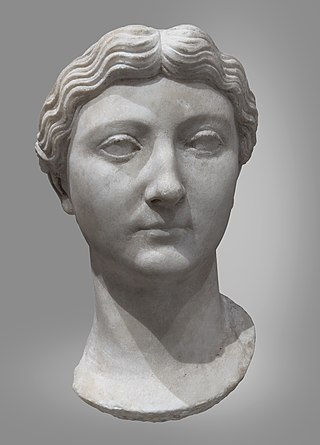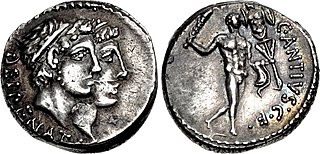Related Research Articles

Julia Agrippina, also referred to as Agrippina the Younger, was Roman empress from 49 to 54 AD, the fourth wife and niece of Emperor Claudius, and the mother of Nero.

Gnaeus Julius Agricola was a Roman general and politician responsible for much of the Roman conquest of Britain. Born to a political family of senatorial rank, Agricola began his military career as a military tribune under Governor Gaius Suetonius Paulinus. In his subsequent career, he served in a variety of political positions in Rome. In 64, he was appointed quaestor in Asia province. Two years later, he was appointed Plebeian Tribune, and in 68, he was made praetor. During the Year of the Four Emperors in 69, he supported Vespasian, general of the Syrian army, in his bid for the throne.

Marcus Claudius Tacitus was Roman emperor from 275 to 276. During his short reign he campaigned against the Goths and the Heruli, for which he received the title Gothicus Maximus.

Nero Claudius Caesar Augustus Germanicus was Roman emperor and the final emperor of the Julio-Claudian dynasty, reigning from AD 54 until his death in AD 68.

Tiberius Julius Caesar Augustus was Roman emperor from AD 14 until 37. He succeeded his stepfather Augustus, the first Roman emperor. Tiberius was born in Rome in 42 BC to Roman politician Tiberius Claudius Nero and his wife, Livia Drusilla. In 38 BC, Tiberius' mother divorced his father and married Augustus. Following the untimely deaths of Augustus' two grandsons and adopted heirs, Gaius and Lucius Caesar, Tiberius was designated Augustus' successor. Prior to this, Tiberius had proved himself an able diplomat, and one of the most successful Roman generals: his conquests of Pannonia, Dalmatia, Raetia, and (temporarily) parts of Germania laid the foundations for the empire's northern frontier.

The Roman historian and senator Tacitus referred to Jesus, his execution by Pontius Pilate, and the existence of early Christians in Rome in his final work, Annals, book 15, chapter 44.

The 10s decade ran from January 1, AD 10, to December 31, AD 19.

Livia Drusilla was Roman empress from 27 BC to AD 14 as the wife of emperor Augustus. She was known as Julia Augusta after her formal adoption into the Julian family in AD 14.

The Chauci were an ancient Germanic tribe living in the low-lying region between the Rivers Ems and Elbe, on both sides of the Weser and ranging as far inland as the upper Weser. Along the coast they lived on artificial mounds called terpen, built high enough to remain dry during the highest tide. A dense population of Chauci lived further inland, and they are presumed to have lived in a manner similar to the lives of the other Germanic peoples of the region.

The Cherusci were a Germanic tribe that inhabited parts of the plains and forests of northwestern Germany in the area of the Weser River and present-day Hanover during the first centuries BC and AD. Roman sources reported they considered themselves kin with other Irmino tribes and claimed common descent from an ancestor called Mannus. During the early Roman Empire under Augustus, the Cherusci first served as allies of Rome and sent sons of their chieftains to receive Roman education and serve in the Roman army as auxiliaries. The Cherusci leader Arminius led a confederation of tribes in the ambush that destroyed three Roman legions in the Teutoburg Forest in AD 9. He was subsequently kept from further damaging Rome by disputes with the Marcomanni and reprisal attacks led by Germanicus. After rebel Cherusci killed Arminius in AD 21, infighting among the royal family led to the highly Romanized line of his brother Flavus coming to power. Following their defeat by the Chatti around AD 88, the Cherusci do not appear in further accounts of the German tribes, apparently being absorbed into the late classical groups such as the Saxons, Thuringians, Franks, Bavarians, and Allemanni.

Lucius Aelius Sejanus, commonly known as Sejanus, was a Roman soldier, friend, and confidant of the Roman Emperor Tiberius. Of the Equites class by birth, Sejanus rose to power as prefect of the Praetorian Guard, of which he was commander from AD 14 until his execution for treason in AD 31.

Germania, also called Magna Germania, Germania Libera, or Germanic Barbaricum to distinguish it from the Roman province of the same name, was a historical region in north-central Europe during the Roman era, which was associated by Roman authors with the Germanic peoples. The region stretched roughly from the Middle and Lower Rhine in the west to the Vistula in the east. It also extended at some point as far south as the Upper and Middle Danube and Pannonia, and to the known parts of southern Scandinavia in the north. Archaeologically, these peoples correspond roughly to the Roman Iron Age of those regions. While dominated by Germanic peoples, Magna Germania was also inhabited by few other Indo-European peoples.

The Great Fire of Rome began on the 18th of July 64 AD. The fire began in the merchant shops around Rome's chariot stadium, Circus Maximus. After six days, the fire was brought under control, but before the damage could be assessed, the fire reignited and burned for another three days. In the aftermath of the fire, 71% of Rome had been destroyed.

The Annals by Roman historian and senator Tacitus is a history of the Roman Empire from the reign of Tiberius to that of Nero, the years AD 14–68. The Annals are an important source for modern understanding of the history of the Roman Empire during the 1st century AD; it is Tacitus' final work, and modern historians generally consider it his greatest writing. Historian Ronald Mellor calls it "Tacitus's crowning achievement", which represents the "pinnacle of Roman historical writing".

The Frisii were an ancient Germanic tribe with Celtic cultural elements living in the low-lying region between the Rhine–Meuse–Scheldt delta and the River Ems.

Publius Cornelius Tacitus, known simply as Tacitus, was a Roman historian and politician. Tacitus is widely regarded as one of the greatest Roman historians by modern scholars.

The gens Antia was a minor plebeian family at ancient Rome. The Antii emerged at the end of the second century BC, and were of little importance during the Republic, but they continued into the third century, obtaining the consulship in AD 94 and 105.

Gaius Silius was a Roman senator who was nominated as consul designate for 49 AD, but was executed by the emperor Claudius for his affair with the empress Valeria Messalina.

The Boudican revolt was an armed uprising by native Celtic Britons against the Roman Empire during the Roman conquest of Britain. It took place circa AD 60–61 in the Roman province of Britain, and was led by Boudica, the Queen of the Iceni tribe. The uprising was motivated by the Romans' failure to honour an agreement they had made with Boudica's husband, Prasutagus, regarding the succession of his kingdom upon his death, and by the brutal mistreatment of Boudica and her daughters by the occupying Romans.
Annaeus Serenus was a close, younger friend and probably also a distant relative of the Roman politician and philosopher Lucius Annaeus Seneca. He belonged to the knighthood.
References
- ↑ Tacitus, Annals, 11, 35, 3